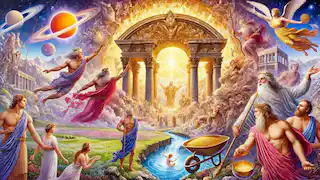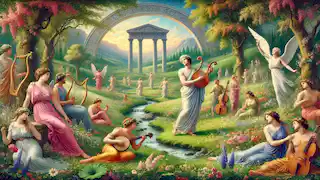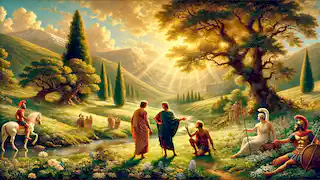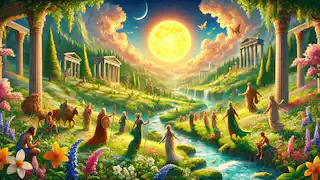The Elysian Fields, an enchanting realm woven into the rich tapestry of Greek mythology, represents an idyllic haven where the most virtuous souls of mortals find eternal bliss. Known also as Elysium, this mythical paradise is shrouded in tales of divine favor, heroism, and unrelenting pursuit of perfection. Beyond the mortal coil, where the mundane meets the eternal, the Elysian Fields glow with perpetual light, welcoming the chosen few deemed worthy by the gods themselves. This is the story of a timeless sanctuary—of its creation, its essence, and the remarkable souls who traversed its verdant landscapes. Long before the time of mortal men, the pantheon of Olympian gods deliberated over the destiny of humanity. Zeus, the king of the gods, sought a way to reward the righteous while balancing justice and divine favor. Inspired by the ceaselessly golden rays of Helios, he envisioned a realm apart from the mundane world—a sanctuary where heroes, poets, and the pious could find eternal solace. The architect of this celestial refuge was none other than Hephaestus, the god of craftsmanship. He forged the gates of Elysium from starry silver and bronze imbued with the light of the sun. Demeter, the goddess of the harvest, blanketed the land with rolling meadows of wheat and fields of wildflowers that never withered. Streams of crystalline water meandered through the verdant plains, their banks lined with willows, laurels, and cypresses. Elysium was not merely a creation of gods but a reflection of harmony and divine justice. Only those who had led lives of true virtue and honor—those who had pursued the path of excellence (arete) and lived in alignment with divine will—could ascend to its meadows. Souls who proved their worth not just in life but in deeds of undying impact were granted passage to this paradise. Among the first souls to grace the fields of Elysium was Orpheus, the legendary musician and poet. Orpheus’s lyre, gifted by Apollo, filled the realm with melodies so divine they awakened the flowers and lulled the streams into a serene dance. He was joined by Perseus, the slayer of Medusa, whose unwavering bravery symbolized humanity’s eternal struggle against darkness. Achilles, though a warrior of blood and conflict, found peace here, his days of battle replaced by an eternity of camaraderie and storytelling. Another famed resident was Penelope, wife of Odysseus, whose fidelity and wisdom were celebrated in life and rewarded in eternity. Each inhabitant brought with them their mortal stories, enriching Elysium with tales of human resilience, courage, and love. Yet, while each soul arrived through their unique path, their presence here was united by the immutable thread of virtue and divine favor. In Elysium, time had no dominion. The sun perpetually bathed the land in golden light, and a gentle breeze carried the fragrance of ambrosial flowers. Mortals who arrived here were granted rejuvenated bodies, free of pain and aging. They lived in splendid harmony, sharing meals of nectar and ambrosia while engaging in spirited games and philosophical debates. The fields themselves reflected the deepest desires of those who walked them. For poets, the grasses whispered verses yet unwritten; for warriors, the meadows transformed into arenas of friendly contest. The rivers, clear as glass, were mirrors to the soul, offering profound revelations to those who gazed into their depths. Entry into Elysium was not guaranteed, even for heroes and the devout. Each soul was brought before the judges of the dead: Minos, Aeacus, and Rhadamanthus. These demigods, impartial and unyielding, weighed the deeds of mortals against the scales of divine justice. Those who erred but repented might find themselves in the Asphodel Meadows, a neutral afterlife. But for those whose lives burned with an undeniable light of virtue, the gates of Elysium swung open. Occasionally, the gods would intervene, bestowing favor on mortals whose lives, while imperfect, demonstrated extraordinary potential. Hercules, for instance, after enduring trials that tested both his strength and morality, was carried by Athena to Elysium, where he found peace from his labors. One legend tells of Pythagoras, the philosopher, who discovered a grove in Elysium where the secrets of the cosmos were inscribed on the bark of ancient trees. He spent eternity deciphering these mysteries, sharing them with kindred souls. Another tale speaks of Calliope, muse of epic poetry, guiding mortal poets in Elysium to craft verses that echoed through the mortal world. These stories often returned as dreams to the living, inspiring creation and progress. The Elysian Fields inspired countless mortal visions of utopia, shaping human ideals of justice, virtue, and reward. To the ancient Greeks, it served not only as a promise of reward but as a reminder to live a life worthy of honor and remembrance. It encouraged mortals to strive for arete, knowing their deeds could echo beyond death. Even in modern times, the concept of Elysium endures as a symbol of peace and ultimate fulfillment. Whether interpreted as a literal afterlife or a metaphorical state of mind, it remains an enduring aspiration for humanity. The story of the Elysian Fields is more than a tale of paradise; it is a testament to the enduring power of virtue, justice, and the human capacity to dream of a perfect world. From the melodies of Orpheus to the wisdom of Pythagoras, Elysium captures the imagination, inviting us to consider the eternal rewards of a life well-lived.The Creation of Elysium

The First Inhabitants

Elysium's Eternal Day

The Trials of Entrance

Legends of the Fields
Elysium’s Enduring Legacy
Closing Reflections
The Story of the Elysian Fields
Reading Time: 5 min

About Story: The Story of the Elysian Fields is a Myth Stories from greece set in the Ancient Stories. This Poetic Stories tale explores themes of Wisdom Stories and is suitable for All Ages Stories. It offers Moral Stories insights. Where virtue meets eternity—a timeless journey into the paradise of ancient Greece.

















